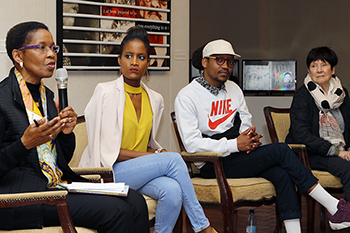
Prof Pumla Gobodo-Madikizela leading a dialogue
held at the Johannes Stegmann Art Gallery with
guest speakers, Candice Mama, Siyah Mgoduka,
and Sue Williamson.
Photo: Johan Roux
The Vice-Chancellor’s Lecture Series on Trauma, Memory and Representations of the Past in the Unit for Trauma, Forgiveness and Reconciliation Studies at the University of the Free State (UFS) hosted a dialogue between students and guest speakers, Sue Williamson, Candice Mama, and Siyah Mgoduka at the Johannes Stegmann Art Gallery on the Bloemfontein campus.
The conversation, led by Prof Pumla Gobodo-Madikizela, Senior Research Professor in Trauma, Forgiveness and Reconciliation Studies at the UFS, touched on students’ direct historical trauma and memory experiences, allowing them to share their contribution to transformation.
Mama and Mgoduka shared their personal experience of how the negative impact apartheid’s fatal events consumed their everyday life. Both their fathers were killed by the apartheid assassin, Eugene de Kock, whom they have met and with whom they have since been reconciled. Reflecting on this historical memory, both of them agree that meeting their fathers’ killer has changed their lives.
“Forgiveness is a personal journey one
takes in order to let go of bitterness and hate.”
“Before meeting De Kock, I was bitter, angry, and full of hatred towards him. After that meeting, I became a better person and more engaged, and stopped stereotyping white people,” says Mama.
Mgoduka says, “Forgiveness alone will not work. There needs to be an interest in each other as black and white.”
The dialogue followed the launch of Williamson’s art exhibition, No More Fairytales, held at the Johannes Stegmann Gallery on 18 August 2016. Through a series of interactive pieces, the artwork captures events that led to the role of the Truth and Reconciliation Commission (TRC).